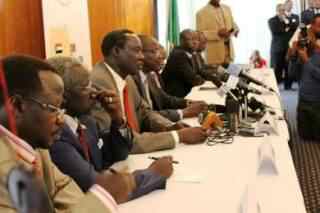SPLM-IO faction says doubt ex-political detainees’ intentions
May 31, 2015 (ADDIS ABABA) – South Sudan’ armed opposition faction of the Sudan Peoples’ Liberation Movement (SPLM-IO) under the leadership of the country’s former vice president, Riek Machar, said they doubted intentions of members of former detainees, sometimes referred to as G-10 led by the former ruling party’s secretary general, Pagan Amum.

Dak was reacting to the news coming out from the South Sudanese capital, Juba, as well as from the Kenyan capital, Nairobi, in which the soon return of former detainees to Juba was announced.
It was not clear under what circumstances the former detainees will return to Juba for the first time since their freedom last year. The ruling party (SPLM) acting secretary-general, Ann Itto, last week announced that the former political detainees would return in implementation of the reunification of the SPLM party per the Arusha intra-party dialogue.
But Amum was quoted in the media as dismissing allegations that his group was returning to Juba as alleged by the SPLM-Juba acting secretary general.
SPLM-IO which has been the main opposition faction and actively fighting the government would not take part in the current ongoing return process to Juba.
However, on Friday, members of former detainees led by former cabinet minister, Deng Alor, met with Kenyan president Uhuru Kenyatta and discussed their return to Juba to try to “reconcile” between president Kiir’s faction and that of his former deputy, Machar. Former secretary-general Amum was however not featured in the group that met the Kenyan president.
They said their role would be to try to reconcile between president Salva Kiir’s government and the opposition faction led by former vice-president Riek Machar. However the acting secretary-general, Ann Itto, stressed that the members of former detainees were returning in implementation of the SPLM agreement on reunification.
She earlier pointed that the returnees would be reinstated into their former positions in the party, while other sources adding that a new cabinet reshuffle would also see many of them appointed to government positions.
Machar’s opposition faction in reaction said they were committed to the Arusha intra-party dialogue as the “three factions” including the former detainees, questioning how the SPLM faction of former detainees had now dropped the initial process and turned into a “neutral reconciling team between warring parties.”
“We know them as party to the conflict whether in Arusha or in Addis Ababa. They have their own grievances and position papers that they present at negotiating tables. We have no idea how they have suddenly become a neutral body which sole role now is to reconcile between us and the government,” Dak told Sudan Tribune on Saturday.
“Have they abandoned their position papers at the negotiating table as a party to the conflict?” he inquired.
He said they were detained in 2013 in Juba because they were never neutral whether as former government officials or party leaders, adding they also actively led in the “SPLM reform initiative with the former first deputy chairperson of the party which president Kiir turned into violence.”
The former detainees, he said, however had the right to pursue their interests separately as they liked including a separate “premature” reunification with president Kiir’s government.
He said the SPLM-IO leadership was not against reconciliation between the factions of the party but added this should come as a result of a negotiated peace agreement that shall be reached between the “three SPLM factions” per the initiated intra-party dialogue and in the Addis Ababa peace process.
Dak further explained there were many issues pending which were highlighted in the October 2013 ‘Arusha roadmap agreement on reunification’ of the SPLM which should be tackled including a joint mechanism for reconciliation process within the ruling party.
He said that even if there were to be a final agreement on reunification of the SPLM party, full implementation of such an agreement would still be anchored to a final peace agreement in Addis Ababa mediated by the East African regional bloc, the Intergovernmental Authority on Development (IGAD).
The rebel official further pointed that issues such as system of governance, security arrangements during the would-be transitional period, accountability, compensation and reparation and reconciliation as well as reforms in various sectors will be tackled in the IGAD-mediated peace process.
He concluded that the leadership of the SPLM-IO was committed to the intra-party dialogue in Arusha, which he said was complementing the Addis Ababa peace process in addressing the root causes of the conflict so as to reach a final peace agreement.
(ST)
